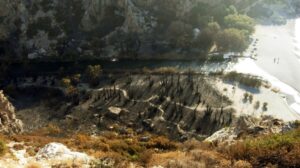Scientists from the Natural History Museum of the University of the island stressed the urgent need to find a permanent solution to the problem in Crete.
According to the experts, the specter of a more generalized drought in Crete in the coming period appears increasingly likely. At the same time, it is pointed out that a comprehensive solution to the problem of water scarcity must be sought, which will include the burning issue of hypertourism, the restructuring of the primary sector, and the formation of a single public water management body.
As Charalambos Fasoulas, Michalis Dretakis, and Petros Lymperakis say: “Already in the second month of summer, the weather conditions we are experiencing, both people and environment, are extreme.”
“For the second year in a row, the hydrological data for Crete is disappointing to the point that the specter of a now generalized drought on the island is looking increasingly likely for the coming period. The minimal rainfall and snow of last winter, combined with the very high average temperatures throughout this year and last, are now creating severe water scarcity conditions in many parts of our island,” the experts continue.
They note that the drier areas such as eastern Crete and Messara, but also more western areas such as Kissamos, are already experiencing severe water shortages, with the local authorities and TOEDBs already taking restrictive, albeit piecemeal, measures. They also add that the minimal to zero supply from the (anyway problematic) dams has led to an increase in the use of groundwater, while the intensification of pumping is bound to lead to the waterlogging of many of them and an increase in damage to pumping equipment.
Over-tourism is magnifying the problems in many areas
“We behave as if there are no impacts from over-exploitation of ground and surface water on ecosystems and humans. It is possible that nature still retains some mechanisms for adapting and coping with extreme conditions…” the scientists say.
But, as they note: “As the summer progresses, pressures and demands will increase, while the peak of the tourist season in August will intensify and magnify the problems in many areas of the island. Based on projections of record arrivals this summer, which every month will double or triple the island’s population, and with the data that the tourism industry itself offers us, that the average visitor spends three times as much water as the resident, we all understand that the conditions that will be created will be explosive.”
It is a given – they add – and already being implemented, that the cuts start with urban and rural use, with perhaps the latest application to the tourism industry. “The intensity of social conflicts between residential, farmers and tourism industry is probably to be expected. We should therefore before we reach this desperate scenario, all take steps to reduce above all waste and then water consumption wherever possible,” they stress.
Measures that can be implemented immediately
Starting with large cities and urban centers, they say, intensive checks of the PPPs for water loss from leaks should be planned first of all and, in addition, restrictive measures should be immediately introduced for washing cars, roads, balconies, etc.
Regarding agriculture, where possible, e.g. olive trees, watering should be stopped, or it should be done prudently and at very infrequent intervals.
.
Finally, the tourist industry of the place should assume its responsibilities and participate directly in informing and sensitizing its customers to the problem of water scarcity and in limiting the waste that is being made.
Approaches to be adopted in the long-term
.
The above, however, according to scientists at the Natural History Museum of the University of Crete, are temporary measures to alleviate the current problem. The overall solution should involve three main discussions:
- The burning issue of ultra-tourism consumes resources (water, energy, waste, infrastructure use, etc.) far beyond the island’s capacity.
- Restructuring of primary production guided by the principles of Agroecology. This approach is the only defense against the impact of the upcoming climate crisis on primary production, in addition to other benefits (better prices and quality) for the producer and society.
- Discussion on the formation of a robust, unified, and above all, public water management body that, in addition to supply and networks, will organize a fair pricing policy according to each use.
Only if we all become aware of the problem and become part of the solution, each of us on a personal level and the whole community thereafter, will we perhaps be able to avoid the bigger problems that are likely to intensify in the future.
.
Ask me anything
Explore related questions





